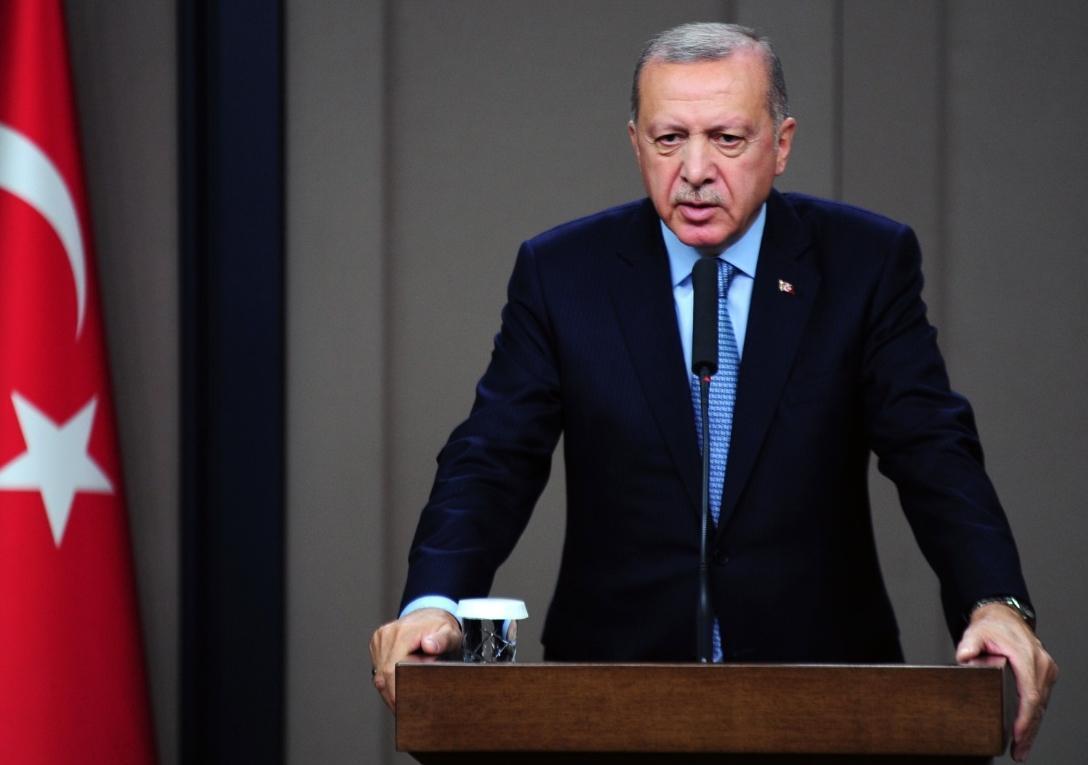
Some 700-800 terrorists have withdrawn from the planned safe zone in northern Syria, as part of the 120-hour-pause of “Operation Peace Spring,” Turkish President Recep Tayyip Erdoğan said on Oct. 21.
“The withdrawal continues. As of now, a withdrawal of 700-800 [terrorists] is being talked about. It’s being told that the remaining 1,200-1,300 groups will rapidly withdraw,” he said.
The president’s remarks came before his departure to Sochi, Russia from the Turkish capital Ankara’s Esenboğa Airport. Erdoğan met with his Russian counterpart Vladimir Putin in Sochi.
The Turkish operation in northern Syria has two main objectives, Erdoğan said.
“The first one is the clearance of the 32-kilometer-deep region from terrorists,” he said, referring to the area starting from the Iraqi border to Jarablus.
Some 2,200-square-kilometer area has been cleared from terrorists, Erdoğan said. “Control has been established in 160 residential areas,” he added.
“Some 775 terrorists have been neutralized since Oct. 9,” Erdoğan said. The operation was launched on late Oct. 9.
If the promises U.S. made to Turkey will not be fulfilled, the operation will continue with more “determination,” Erdoğan said.
Turkey is working to provide the safe return of two million Syrian refugees to the to-be established safe zone, he added.
“Turkey cannot bear this burden, it has been carrying for eight years, anymore. We are aiming to increase our cooperation with Russia in this critical process,” he said.
“Turkey and Russia are unanimous on the fight against any type of terror,” Erdoğan said.
When asked about French President Emmanuel Macron’s remarks on the extension of the cease-fire, Erdoğan said no offer has been made.
“Macron is discussing these kinds of topics with terrorists. He probably wanted to indirectly convey the terrorist’s offer to us. Our state party is the U.S., not France,” he said.
Regarding Iranian President Hassan Rouhani’s remarks on the operation, Erdoğan said the former’s statements was “saddening.”
“Some cracked voices are raising from Iran. Not only from Rouhani, but from his fellows as well. Of course, these needed to be silenced especially by Mr. Rouhani,” he said.
“We are the three countries of the Sochi agreement. How will we carry out this process? Can partnered countries betray each other like this?” he questioned.
Erdoğan and Putin held a meeting on Oct. 22, hours before the 120-hour time span for the pause of “Operation Peace Spring” expires at 22:00 p.m. local time.
The meeting’s agenda is expected to be dominated by the latest developments in Syria.
With the withdrawal of U.S. troops in Syria, a major part of the regions not included in “Operation Peace Spring” went under the regime’s control. The U.S. started the withdrawal from military bases in the northeastern Syrian city of Al-Hasakah to northern Iraq.
The Russia-backed Assad regime’s forces have hung its flag in Manbij, Kobane, Ain Issa, Tell Tamer, Al-Hasakah and Qamishli.
Ankara and Moscow have made statements before the critical meeting.
“The bilateral relations between Turkey and Russia are planned to be discussed [in the meeting], and views on regional and international issues, Syria in particular, are expected to be exchanged during the talks in Sochi,” a statement by the Turkish presidency read on Oct. 21.
Meanwhile, Putin’s foreign policy advisor Yuri Ushakov said the main topic in the meeting will be Turkey’s “Operation Peace Spring.”
“The most important thing for us is achieving long-term stability in Syria and the region,” Ushakov told reporters ahead of the talks.
“We believe this can only be achieved by restoring the unity of Syria,” he added.
Russia’s Foreign Minister Sergey Lavrov pointed at the Adana Protocol and said dialogue needs to be established between Ankara and Damascus.
“A dialogue between Turkey and the Syrian Arab Republic is necessary, where we are also ready to play a supporting role and encourage such direct contacts. It is obvious that the dialogue between Ankara and Damascus should be based on the Adana agreement of 1998,” Lavrov said.
The Adana Protocol signed between Turkey and Syria in 1998 that stipulates the latter’s cessation of its support to the PKK is believed to provide the necessary foundation of a potential Ankara-Damascus dialogue.